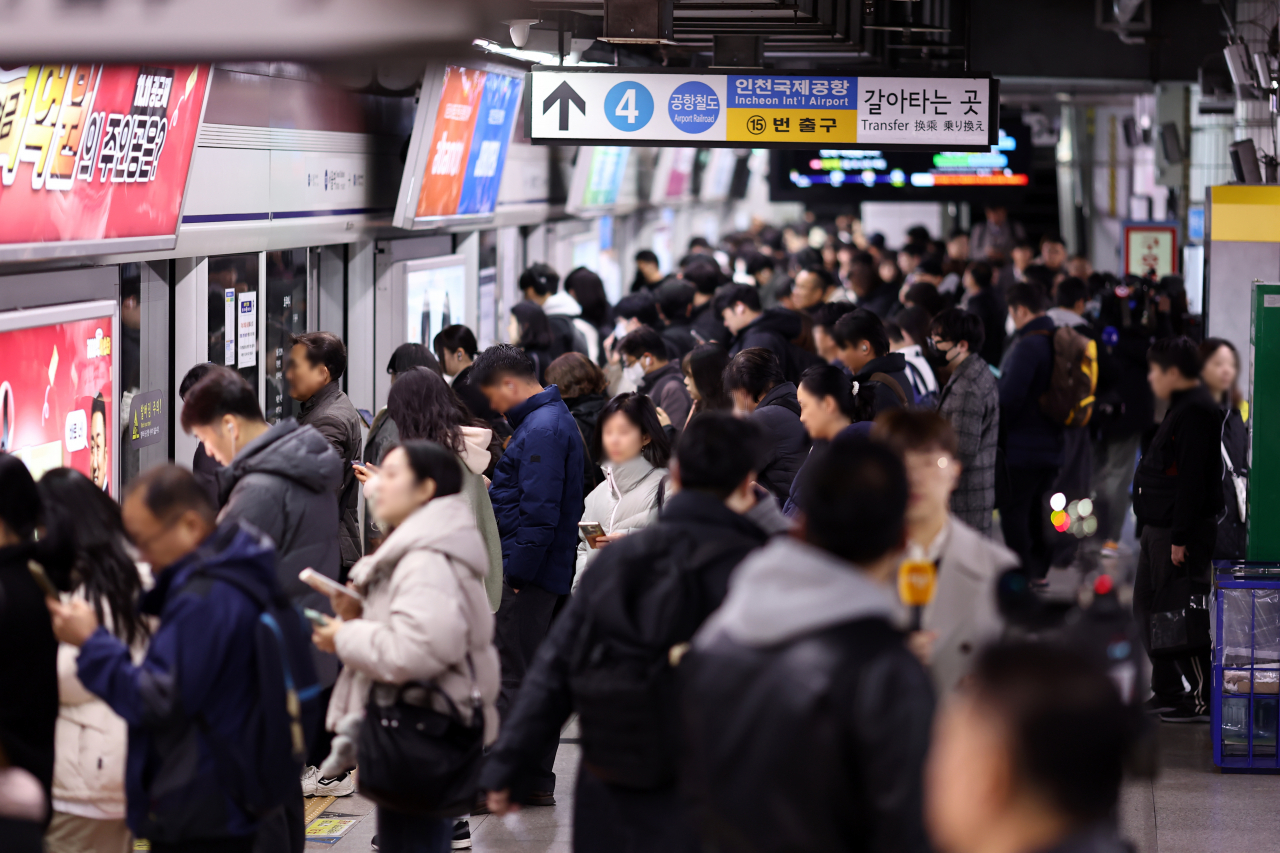
 |
| Passengers wait for a subway at Seoul Station on Monday, on the day the Korean Railway Workers' Union launched a work-to-rule strike to demand better working conditions. (Yonhap) |
Passengers in the capital region face potential disruptions on their commute, as unionized railroad workers begin a partial "work-to-rule" protest Monday, warning of a potential indefinite strike from next month. On the same day, the main labor union of Seoul Metro, which operates subway Line Nos. 1 through 8, said it had voted in favor of staging a strike to demand better working conditions, a move that could plague transport services in the capital area.
The work-to-rule protest -- in which workers pledge to only do the contractual bare minimum -- by the Korean Railroad Workers' Union demanding a wage increase and the hiring of more staff caused slowdowns in subway services during peak hours for commuters Monday morning.
The labor action comes after unionized workers at the state-run Korea Railroad Corp., also known as Korail, demanded an increase of 2.5 percent in their basic salary and for the company to hire more workers, as they say the company is severely short-staffed.
The union said in a press release that the Finance Ministry is pushing to cut the number of Korail employees by 1,566 positions despite the ongoing staffing shortage, which would worsen workloads, conditions and safety for both workers and passengers. The national railway operator, however, said it has "no plans yet" to downsize.
The union also demands better working conditions, such as shifting to a four-team, two-shift system to ensure that railway workers do not work the night shift for two days in a row, and implementing a fair promotion system.
Unionized workers plan to launch an indefinite general strike early next month if they fail to seal a deal with the company, which could be the first such strike since September last year. They are to announce their future course of action during a press conference slated for Thursday.
Later in the day, the Seoul Transit Corp. Labor Union, the main labor union of the operator of subway Lines Nos. 1-8, said its members voted in favor of staging a strike to demand a wage hike and new hiring. This comes after the union failed to reach an agreement with management last month after 19 rounds of negotiations. To settle the issue, the union requested mediation with the Seoul Regional Labor Relations Commission on Nov. 1.
The Seoul Metro labor group noted that unionized workers would "have the legal right to strike" if the two sides failed to find middle ground during the second mediation meeting that started Monday afternoon. Unless a settlement is reached, the union said it would hold a press conference Tuesday to announce detailed plans for the strike.
Meanwhile, the work-to-rule protest, in which productivity and efficiency are slowed down while workers strictly comply with safety regulations and laws, led to some 140 trains in the metropolitan area running 10 minutes behind schedule as of Monday at 9 a.m., according to Korail. Approximately 120 trains were delayed by more than 20 minutes, with passengers experiencing extended wait times.
Korail operates the following lines
In the Greater Seoul area Korail operates: Line No. 1 from Yeoncheon to Kwangwoon University to Guro, and also from Guro to Incheon, Sinchang and Gwangmyeong; Line No. 3 from Daehwa to Samsong; Line No. 4 from Seonbawi to Geumjeong to Oido; the Suin-Bundang Line; the Gyeongchun Line; the Gyeongui-Jungang Line and the Seohae Line.
Disruptions affected key commuter subway lines in the capital area, such as Line Nos. 1, 3 and 4 -- lines that carry a large number of passengers and connect key areas in Seoul and the surrounding region -- as well as the Suin-Bundang Line, which connects southern Seoul and Incheon, and the Gyeongui-Jungang and Seohae Lines, officials added. All regular trains and high-speed KTX trains were operating normally.
Korail explained that a number of workers had deliberately slowed down operations as part of the work-to-rule protest by saying they would visit the bathroom before starting their shifts, while still adhering to workplace guidelines.
To cope with the disruptions, Korail notified passengers of cancellations of train services and changes in train destinations.
During morning peak hours at Seoul's Yongsan Station -- through which Line Nos. 1 and 4 run, along with the Gyeongui-Jungang Line -- an announcement was made every 10 minutes on the metro platform advising passengers to consider other transportation options due to delays, according to reports. The reports added that some overcrowded subways could not accept additional passengers to board.
While service delays will not likely impact passengers during the daytime, Korail noted that delays in train services could also disrupt operations during evening rush hours.
Meanwhile, the national railway operator said it had set up an emergency task force the previous day to minimize passengers' inconvenience and further problems. Officials added that they would take "stern action" against any violations of company rules or the law by protesting union workers.
In September last year, the union held its first collective action in about four years by launching a four-day general strike, asking for improvements in working conditions and to allow KTX train services to access Suseo Station in southern Seoul.









